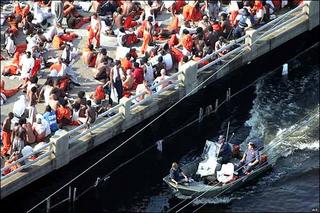Aid?
 (Excerpt from Paul Krugman, "A Can't-Do Government," The New York Times, 9/2/05)
(Excerpt from Paul Krugman, "A Can't-Do Government," The New York Times, 9/2/05) Before 9/11 the Federal Emergency Management Agency listed the three most likely catastrophic disasters facing America: a terrorist attack on New York, a major earthquake in San Francisco and a hurricane strike on New Orleans. "The New Orleans hurricane scenario," The Houston Chronicle wrote in December 2001, "may be the deadliest of all." It described a potential catastrophe very much like the one now happening. So why were New Orleans and the nation so unprepared? After 9/11, hard questions were deferred in the name of national unity, then buried under a thick coat of whitewash. This time, we need accountability. First question: Why have aid and security taken so long to arrive? Katrina hit five days ago - and it was already clear by last Friday that Katrina could do immense damage along the Gulf Coast. Yet the response you'd expect from an advanced country never happened. Thousands of Americans are dead or dying, not because they refused to evacuate, but because they were too poor or too sick to get out without help - and help wasn't provided. Many have yet to receive any help at all. There will and should be many questions about the response of state and local governments; in particular, couldn't they have done more to help the poor and sick escape? But the evidence points, above all, to a stunning lack of both preparation and urgency in the federal government's response. Even military resources in the right place weren't ordered into action. "On Wednesday," said an editorial in The Sun Herald in Biloxi, Miss., "reporters listening to horrific stories of death and survival at the Biloxi Junior High School shelter looked north across Irish Hill Road and saw Air Force personnel playing basketball and performing calisthenics. Playing basketball and performing calisthenics!"

1 Comments:
The situation in New Orleans, which had seemed as bad as it could get, became considerably worse yesterday with reports of what seemed like a total breakdown of organized society. Americans who had been humbled by failures in Iraq saw that the authorities could not quickly cope with a natural disaster at home. People died for lack of water, medical care or timely rescues - particularly the old and the young - and victims were almost invariably poor and black. The city's police chief spoke of rapes, beatings and marauding mobs. The pictures were equally heartbreaking and maddening. Disaster planners were well aware that New Orleans could be flooded by the combined effects of a hurricane and broken levees, yet somehow the government was unable to immediately rise to the occasion.
Watching helplessly from afar, many citizens wondered whether rescue operations were hampered because almost one-third of the men and women of the Louisiana National Guard, and an even higher percentage of the Mississippi National Guard, were 7,000 miles away, fighting in Iraq. That's an even bigger loss than the raw numbers suggest because many of these part-time soldiers had to leave behind their full-time jobs in police and fire departments or their jobs as paramedics. Regardless of whether they wear public safety uniforms in civilian life, the guardsmen in Iraq are a crucial resource sorely missed during these early days, when hours have literally meant the difference between evacuation and inundation, between civic order and chaos, between life and death.
The gap is now belatedly being filled by units from other states, though without the local knowledge and training those Mississippi and Louisiana units could supply. The Pentagon is sending thousands of active-duty sailors and soldiers, including a fully staffed aircraft carrier, a hospital ship and some 3,000 Army troops for security and crowd control (even though federal law bars regular Army forces from domestic law enforcement, normally the province of the National Guard).
But it's already a very costly game of catch-up. The situation might have been considerably less dire if all of Louisiana's and Mississippi's National Guard had been mobilized before the storm so they could organize, enforce and aid in the evacuation of vulnerable low-lying areas. Plans should have been drawn up for doing so, with sufficient trained forces available to carry them out.
It's too late for that now. But the hard lessons of this week must be learned and incorporated into the nation's plans for future emergencies, whether these come in the form of natural disasters or terrorist attacks. Every state must now update its plans for quick emergency responses and must be assured by the Pentagon that it will be able to keep enough National Guard soldiers on hand to carry out these plans on very short notice.
Things would have been even worse if a comparable domestic disaster had struck last year, when an even greater percentage of National Guard units were deployed in Iraq and Afghanistan. Some states had more than two-thirds of their Guard forces overseas. After several governors protested, the Pentagon agreed to adjust its force rotations so no state would be stripped of more than half of its guardsmen at any one time. That promise has been kept so far. But honoring it in the months ahead will be extremely difficult with active-duty forces so badly overstretched in Iraq, and prospects for any significant early withdrawals looking bleak.
One lasting lesson that has to be drawn from the Gulf Coast's misery is that from now on, the National Guard must be treated as America's most essential homeland security force, not as some kind of military piggy bank for the Pentagon to raid for long-term overseas missions. America clearly needs a larger active-duty Army. It just as clearly needs a homeland-based National Guard that's fully prepared and ready for any domestic emergency.
(Editorial from The New York Times, 9/02/05)
Post a Comment
<< Home